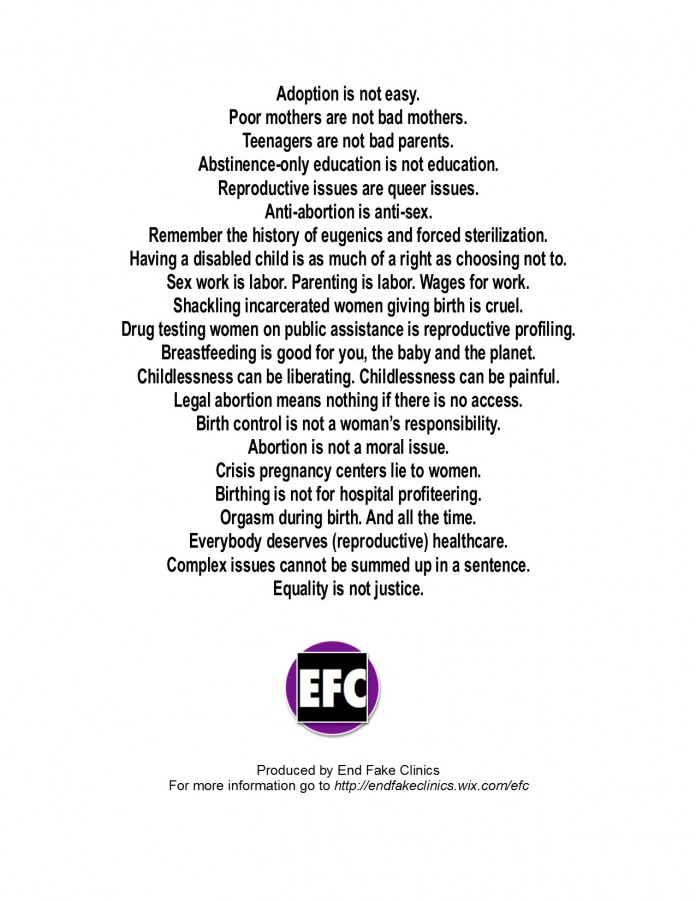End Fake Clinics at UCSB
We are End Fake Clinics. We are feminists. We are queer. We are students. We are for reproductive justice.
The reproductive justice approach to activism historically arose from the perspectives of women of color as a way to push the mainstream reproductive rights movement beyond their focus on abortion and birth control. Women of color recognized that the pro-choice framework was limited and exclusionary because all women don’t have equal choices and because all choices are not deemed equal. Reproduction goes beyond the workings of the body; how we understand reproduction is social, historical, geographic, political, and discursive. It changes over time and is impacted by the spaces and the places where we live. The reproductive justice approach brings together the concerns of reproductive rights movements with a broader focus on social justice, and, in doing so, works to change the broader structures that impact how people experience reproduction.
Reproductive justice is recognizing that age, class, race, ability, sexuality and gender shape reproductive experiences. Reproductive justice is working to expose the dangers of crisis pregnancy centers, the unregulated anti-abortion centers that lure young and poor women with the promise of free pregnancy tests, and disguise themselves as neutral medical providers, but give false information regarding sexual and reproductive health. Reproductive justice is de-stigmatizing and celebrating abortion rather than denouncing it. Reproductive justice is acknowledging that birth control can be dangerous and that it is not just a woman’s responsibility. Reproductive justice is preventing environmental toxins from entering women’s bodies. Reproductive justice is condemning capitalism. Reproductive justice is seeing sex work as labor. Reproductive justice is not seeing disability as a burden. Reproductive justice critiques the medicalization of childbirth; it is celebrating alternative ways of child bearing and rearing. Reproductive justice is challenging the assumption that women of color and low-income women are not equipped to be mothers. Reproductive justice is imagining alternative constructions of motherhood. Reproductive justice is advocating for a living wage. Reproductive justice issues are trans issues. Reproductive justice is fighting the shackling of incarcerated women during childbirth as well as the broader prison industrial complex and its targeting of communities of color. Reproductive justice is ending the deportations of undocumented people and the separating of families. Reproductive justice issues are queer issues. Reproductive justice is imagining alternative ways of being, living and existing in our world.
As members of End Fake clinics, we work to both raise awareness about these issues and create change at UCSB and in our various communities. In 2011, UCSB became the first university in the country to pass a ban that prevented crisis pregnancy centers from advertising on our campus. Other cities and universities have passed “truth in advertising” bills that require CPCs to state that they do not provide abortions. But UCSB went a step further to ban CPCs from advertising through any Associated Students entities on our campus. We are now working to prevent Network Medical, a local crisis pregnancy center, from advertising in our campus coupon books.
Throughout the year, we organize film screenings and talks by activists and academics that feature alternative perspectives on reproduction. This week we hosted a film screening of “The Business of Being Born” which outlines the problems with the medicalization of birth and the benefits of natural childbirth. Midwives from the Santa Barbara Birth Center led a discussion afterwards. And we counter the lies that circulate about abortion through our ongoing “Truth about Abortion” poster campaign.
End Fake Clinics comes together to inform ourselves and the broader campus community about issues that are not often discussed. We spread awareness of reproductive justice issues and perspectives on our campus through both our radio show, The Reproductive Justice Power Hour, on KJUC and also through a new poster campaign that critiques both anti-abortion and mainstream pro-choice ideologies. Look for these posters today. You can see the posters all over campus.
We are End Fake Clinics. For more information, search End Fake Clinics on Facebook and check out our website: http://endfakeclinics.wix.com/efc We meet on Tuesdays at the Women’s Center at 6pm. Join us as we explore various reproductive justice issues and work to make our campus and communities more just.











